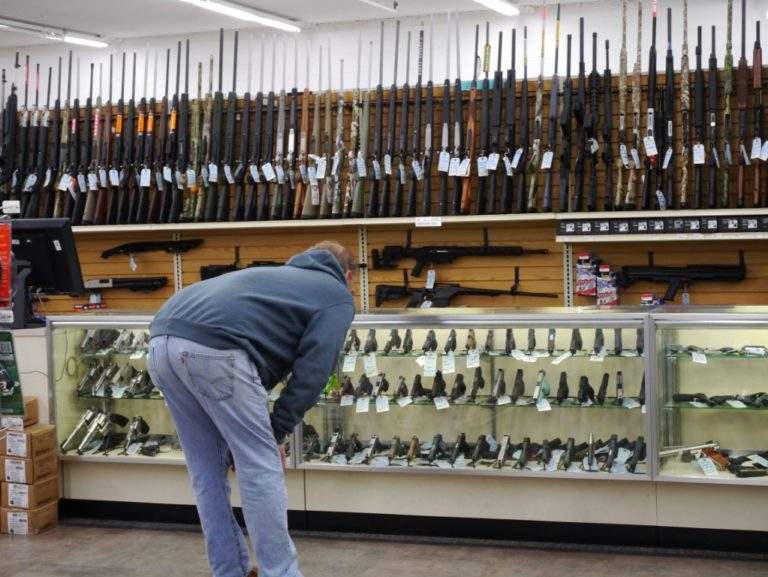FFLs Make the Gun World Work
If you’ve ever shopped for a new gun or had one shipped to a local store for pickup, you’ve likely worked with a Federal Firearms License (FFL) holder. But what is an FFL dealer, exactly? And how do they fit into the buying process? This FFL dealer guide will walk you through FFL dealer responsibilities, from background checks to online transfers, so you can feel informed and confident when you purchase a firearm.

Table of Contents
Introduction: What Is an FFL Dealer?
A Federal Firearms License (FFL) allows a person or business to sell, transfer, or sometimes manufacture firearms in compliance with federal law. When we say “FFL dealer,” we typically mean a storefront, online retailer, or even a home-based business that’s licensed to facilitate sales. Under U.S. law, all new guns sold across state lines must go through an FFL holder who completes the necessary background checks. Understanding what is an FFL dealer is key to navigating any firearm transaction, whether you’re buying your first hunting rifle or ordering a rare collector piece.
Why Does an FFL Dealer Matter?
It’s easy to assume that buying a gun is as simple as picking one out and paying for it (if you’re a know-nothing liberal). However, firearms in the United States fall under specific rules to ensure buyer eligibility. Federal law states:
- Buyers must be at least 18 to purchase long guns (rifles or shotguns) and 21 for handguns.
- Firearms can only be shipped to an FFL dealer, who will confirm you’re legally allowed to own a gun under federal, state, and local laws.
Without an FFL dealer in the mix, new firearms could not legally reach the consumers. Put simply, there is no “gun show loophole” either. Everyone selling at a gun show is an FFL dealer
How Do You Buy a Firearm Through an FFL Dealer?
Select Your Gun
Whether shopping online or at a brick-and-mortar store, you pick out the firearm you want. If buying online, you’ll need to choose an FFL near you to receive the shipment. Next steps will be determined if you are shopping online or in a brick-and-mortar store.

Pick an FFL Dealer
- Preferred/Network FFL: Most online retailers maintain relationships with specific dealers who expedite the process.
- Out-of-Network FFL: If the store doesn’t have a preferred list, or it’s easier for you, you’ll contact your local shop and confirm they’re willing to handle the transfer.
Complete the Purchase
- You pay for the firearm (and possibly a modest shipping fee).
- Your chosen FFL might also charge a transfer fee and possibly sales tax.
Arrive and Fill Out Paperwork
- Once your gun arrives, you visit the FFL dealer’s location.
- You complete a Form 4473.
- They will run a background check (via the National Instant Criminal Background Check System or NICS).
- If you pass, you will generally be able to leave with your firearm, but some states impose a waiting time before you can leave with the firearm.
FFL Dealer Responsibilities and Services
Each day, a licensed dealer juggles various tasks to comply with ATF regulations. These core FFL dealer responsibilities may include:
- Running Background Checks: A key function is verifying a buyer’s legal eligibility. Using the NICS system, they confirm whether you can receive the firearm.
- Facilitating Firearm Transfers: When you order a gun online, it’s shipped to an FFL who logs it into their records, completes the legal transfer, and logs it out to you.
- Conducting Gun Sales: Your local shop might sell new or used firearms directly from their inventory.
- Offering Gunsmithing Services (If Licensed): Most FFL dealers have the proper license type to perform repairs or modifications, but not all are set up to do so.
- Manufacturing or Importing (If Licensed): With the correct license, an FFL holder may assemble firearms, produce ammunition, or import foreign firearms.
Keep in mind that not all FFLs offer gunsmithing or manufacturing—this depends on their specific license type.
Types of FFL Licenses
The Bureau of Alcohol, Tobacco, Firearms, and Explosives (ATF) grants various license types. Here’s a quick look at the most common categories relevant to the everyday consumer:
- Type 01: Dealer/Gunsmith
- Standard license for retail firearm sales and basic repairs.
- Type 02: Pawnbroker
- Similar to Type 01, but specifically for businesses that pawn firearms.
- Type 07: Manufacturer
- Allows both making and selling firearms (other than destructive devices).
- Type 08 & 11: Importer
- For bringing firearms or ammunition into the U.S.
For a FFL dealer guide focused on retail sales, you’ll usually encounter Type 01 or Type 07. Dealers with a Type 07 FFL can produce (manufacture) firearms, which gives them more flexibility than a standard retail operation.
Curios and Relics (C&R) FFL Dealers
While most FFL dealers focus on modern firearms, there is a special category for collectors called the Curios and Relics (C&R) license (Type 03). This license is specifically for enthusiasts who love collecting older or historically significant guns. C&R holders can:
- Acquire eligible firearms (at least 50 years old or otherwise designated as a curio/relic) directly across state lines.
- Focus on building a personal collection rather than full commercial sales.
Unlike a typical FFL dealer, someone with only a C&R license cannot engage in standard retail firearm sales and doesn’t conduct extensive business operations. They mainly facilitate interstate transactions for collectible arms, making them a unique slice of the FFL community.
Behind the Scenes: Gun Transfers & Paperwork
Logging Firearms Into Inventory
Once a shipment arrives, the dealer must record it in their official “bound book” or an ATF-approved digital system. Each entry includes the date, model, caliber, and serial number. This meticulous record-keeping is mandatory for all firearms handled.
NICS Background Checks
When a buyer comes in for a pickup, the buyer completes a Form 4473, verifying identity and eligibility under federal law and the FFL initiates a NICS background check. This process confirms the buyer hasn’t committed disqualifying crimes and meets the age requirements.
Potential Transfer Fees
The majority of FFLs charge a service fee (often $20–$50) for receiving and transferring firearms, though costs vary by region and store. This fee covers the dealer’s time, paperwork, and overhead.
Final Inspection
Before you fill out any paperwork, always inspect the firearm to confirm it’s the correct make, model, and caliber. If you notice a problem—like a scratched finish or wrong caliber—notify your FFL dealer immediately. Once the transfer is legally complete, returns may be impossible or require a significant restocking fee.
Common FAQs
Q: Can I buy a gun online and have it shipped to my house?
A: No. Federal law says firearms must be shipped to an FFL dealer, who finalizes the transfer after a background check.
Q: Do I need to pay a transfer fee if I buy a gun directly at a local gun shop?
A: Typically, no. If you’re purchasing a firearm directly from their inventory, the transfer fee is included in the price of the gun.
Q: Can I ship a gun to a friend in another state?
A: No. Sending firearms across state lines must go through an FFL, who will ensure legal compliance.
Q: Do all FFL dealers provide gunsmithing services?
A: Not necessarily. Gunsmithing usually requires at a Type 01 license, but not all FFL’s are set up for major gunsmithing work. Always ask your local dealer if they’re equipped for repairs or modifications.
Q: Is there a gun show loophole?
A: No. Anyone selling a gun at a gun show must be an FFL. Private party sales on the property are not allowed by gun shows. If you show up expecting to be able to skip a background check you’ll get laughed at at best and escorted out at worst.
Conclusion - Policing the Brass
From overseeing online transfers to conducting background checks and logging firearms, a Federal Firearms Licensee is an essential piece of the puzzle for legal gun ownership in the United States. By now, you should have a clear grasp on what is an FFL dealer, as well as how to pick the right one and what to expect when you walk in to transfer or purchase a firearm. With this FFL dealer guide in mind, you’ll be better equipped to navigate the process and ensure you’re following every rule. Whether you’re a first-time buyer or a seasoned collector, working with a knowledgeable FFL means smoother transactions, safer processes, and confidence that you’re doing everything by the book.


